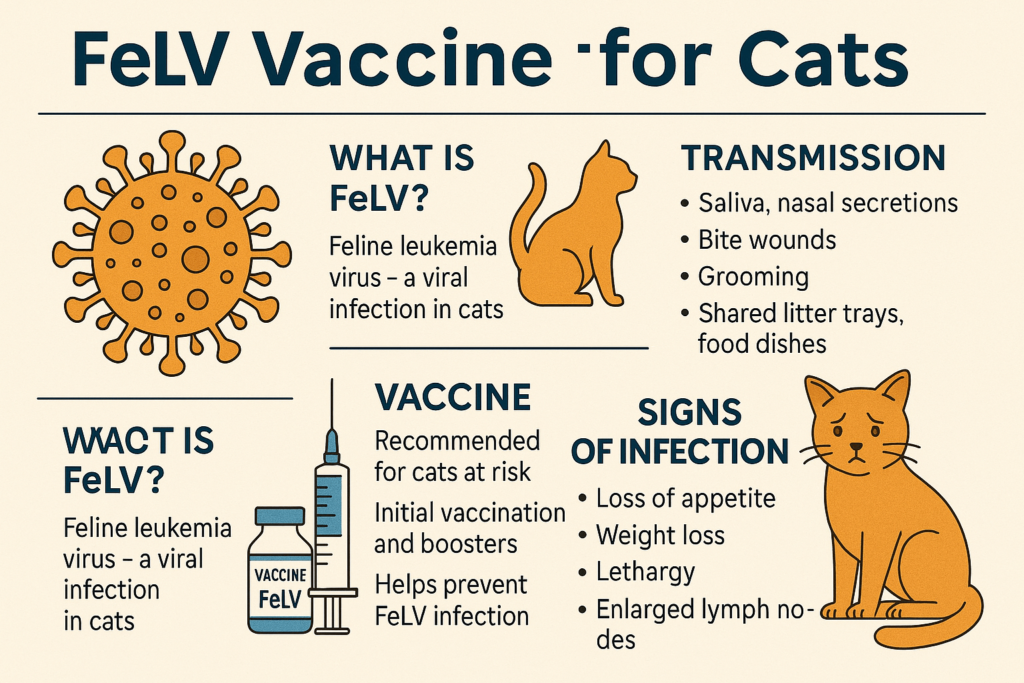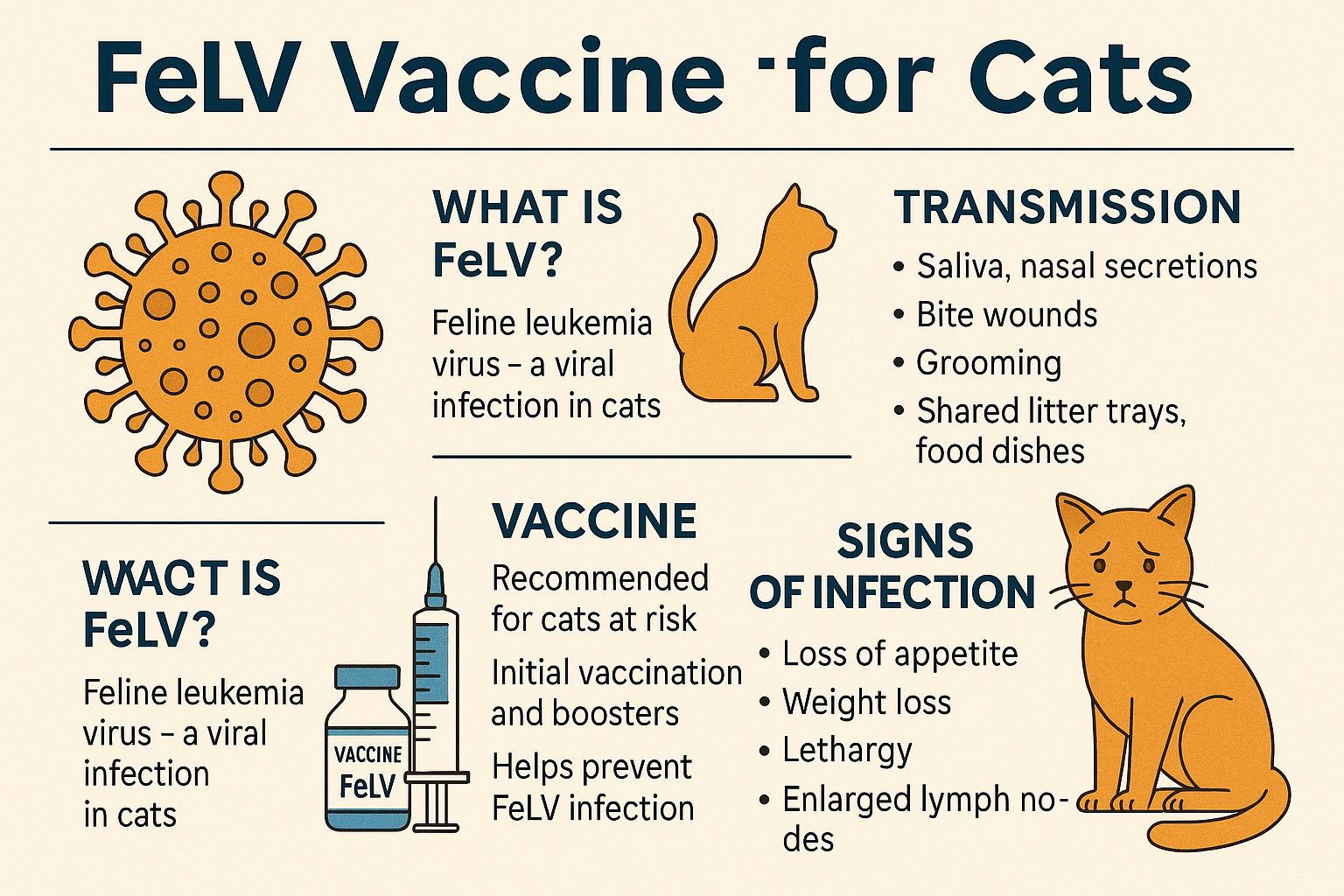FeLV Vaccine for Cats: What You Need to Know
Feline Leukemia Virus (FeLV) is a serious and often fatal disease that affects cats worldwide. As a responsible pet owner, understanding the importance of the FeLV vaccine can make all the difference in protecting your furry friend. The vaccine is a key tool in preventing this contagious virus, which weakens a cat’s immune system and leaves them vulnerable to other infections. Whether you’re a new cat owner or simply looking to stay informed, this guide will walk you through everything you need to know about the FeLV vaccine—its benefits, risks, and how it fits into your cat’s overall health plan.
Expert Insight on FeLV
“FeLV is a retrovirus, which means that it operates by inserting its own DNA into the cells it has infected, effectively hijacking the body’s own cellular replication system. FeLV is prevalent in cat populations throughout the world, with a prevalence of between 3 to 13% in the US, and is the most common cause of feline cancer.”
Understanding Feline Leukemia Virus (FeLV)
Before diving into the specifics of the FeLV vaccine, it’s essential to understand what Feline Leukemia Virus is and why it poses such a significant threat to cats. This knowledge highlights the importance of vaccination as a preventive measure.
Highly Contagious Nature:
FeLV spreads through saliva, nasal secretions, urine, and feces, making close contact between cats a primary risk factor.Weakened Immune System:
Infected cats often suffer from a compromised immune system, making them more susceptible to secondary infections and diseases.Potential for Cancer Development:
FeLV is linked to various types of cancer, including lymphoma, which can significantly reduce a cat’s lifespan.No Cure Available:
While supportive care can help manage symptoms, there is currently no cure for FeLV, emphasizing the need for prevention.Higher Risk for Outdoor Cats:
Cats that roam outdoors or interact with unknown felines face a greater risk of exposure to the virus.
By understanding these risks, cat owners can appreciate the critical role the FeLV vaccine plays in safeguarding their pets’ health.

Benefits of the FeLV Vaccine
The FeLV vaccine is a cornerstone of preventive healthcare for cats, offering numerous advantages that extend beyond individual protection. Here’s why vaccinating your cat against FeLV is so important.
Prevents Disease Transmission:
Vaccinated cats are far less likely to contract FeLV, reducing the spread of the virus within multi-cat households or communities.Protects Vulnerable Kittens:
Kittens are especially susceptible to FeLV, and early vaccination provides them with critical immunity during their formative months.Reduces Risk of Secondary Infections:
By preventing FeLV, the vaccine helps maintain a strong immune system, lowering the likelihood of opportunistic illnesses.Peace of Mind for Owners:
Knowing your cat is protected from this devastating virus allows you to enjoy their companionship without constant worry.Supports Multi-Cat Households:
Vaccination ensures harmony and safety in homes with multiple cats, minimizing the risk of outbreaks.
With these benefits in mind, the FeLV vaccine emerges as a vital component of responsible cat ownership.
Check this guide 👉Signs of Cat Leukemia: Best 7 Expert Tips!
Check this guide 👉Cat Vaccine Side Effects: Best 7 Expert Tips!
Check this guide 👉I Dont Know If My Cat Has Been Vaccinated: Best 7 Tips!
Advantages of the FeLV Vaccine | Risks of Not Vaccinating |
|---|---|
Prevents transmission of the virus | Higher risk of contracting FeLV |
Protects kittens and senior cats | Increased vulnerability to infections |
Reduces chances of developing cancer | Potential for severe illness or death |
Provides peace of mind for owners | Financial burden of treating FeLV cases |
Ensures safety in multi-cat environments | Spread of the virus to other cats |
When Should Your Cat Receive the FeLV Vaccine?
Timing is crucial when it comes to administering the FeLV vaccine. Understanding the recommended schedule ensures your cat receives maximum protection at the right stages of life.
Kittens Under 12 Weeks Old:
Kittens should receive their first FeLV vaccine as early as 8-9 weeks of age to build immunity during their most vulnerable period.Booster Shots After Initial Dose:
A second dose is typically given 3-4 weeks after the initial vaccine to ensure full effectiveness.Annual Boosters for High-Risk Cats:
Outdoor cats or those frequently exposed to unfamiliar felines may require yearly boosters to maintain immunity.Testing Before Vaccination:
Veterinarians often recommend testing for FeLV before administering the vaccine to confirm the cat isn’t already infected.Consultation with Your Vet:
Discuss your cat’s lifestyle and risk factors with your veterinarian to determine the best vaccination schedule.
Following these guidelines ensures your cat remains protected throughout their life.
Potential Side Effects of the FeLV Vaccine
Like any medical intervention, the FeLV vaccine may cause side effects in some cats. While these reactions are generally mild, it’s important to be aware of them and monitor your cat closely.
Mild Swelling at Injection Site:
Temporary swelling or discomfort at the injection site is common but usually resolves within a few days.Lethargy or Reduced Appetite:
Some cats may appear tired or eat less than usual for a short period after vaccination.Rare Allergic Reactions:
Severe allergic reactions are uncommon but can occur; signs include difficulty breathing or facial swelling.Sarcoma Development (Rare):
In very rare cases, vaccines have been linked to fibrosarcomas, a type of tumor, though this risk is extremely low.Monitoring Post-Vaccination:
Keep an eye on your cat for 24-48 hours after the shot and report any unusual symptoms to your vet immediately.
While side effects are possible, the benefits of the FeLV vaccine far outweigh the risks for most cats.
Signs Your Cat May Be at Risk of FeLV
Identifying whether your cat is at risk of contracting FeLV is the first step toward protecting them. Here are some signs and scenarios that indicate your cat may benefit from vaccination.
Frequent Outdoor Exploration:
Cats that spend time outside unsupervised are more likely to encounter infected felines.Living in Multi-Cat Households:
Homes with many cats increase the chances of virus transmission if one cat becomes infected.Exposure to Stray or Unknown Cats:
Interaction with stray or unvaccinated cats raises the risk of FeLV exposure.Unexplained Weight Loss or Lethargy:
These symptoms could indicate infection, warranting immediate testing and vaccination.History of Fighting or Bites:
Bite wounds are a common mode of FeLV transmission, making aggressive cats particularly vulnerable.
Recognizing these risk factors allows you to take timely action to protect your cat.
How to Minimize FeLV Risks Beyond Vaccination
While the FeLV vaccine is essential, additional measures can further reduce your cat’s risk of infection. Combining vaccination with these strategies creates a robust defense system.
Keep Your Cat Indoors:
Limiting outdoor access reduces exposure to potentially infected animals.Test New Cats Before Introducing Them:
Ensure any new additions to your household are FeLV-free before bringing them home.Separate Infected Cats:
If one cat tests positive for FeLV, keep them isolated to prevent spreading the virus.Regular Veterinary Check-Ups:
Routine exams help detect early signs of illness and ensure ongoing protection.Provide Enrichment Indoors:
Keeping your cat entertained indoors minimizes their desire to venture outside.
These steps complement the FeLV vaccine, creating a safer environment for your cat.
Debunking Myths About the FeLV Vaccine
Misinformation about the FeLV vaccine can lead to hesitation among cat owners. Clearing up these myths ensures you make confident, informed decisions about your cat’s health.
Myth: The Vaccine Causes FeLV Infection:
Fact: The vaccine cannot cause FeLV; it only stimulates immunity against the virus.Myth: Indoor Cats Don’t Need It:
Fact: Even indoor cats can escape or encounter infected animals, making vaccination wise.Myth: The Vaccine Is Dangerous:
Fact: Serious side effects are rare, and the vaccine’s benefits far outweigh its risks.Myth: One Shot Lasts a Lifetime:
Fact: Boosters are often needed to maintain immunity, especially for high-risk cats.Myth: Testing Isn’t Necessary Before Vaccination:
Fact: Pre-vaccination testing ensures the cat isn’t already infected, avoiding ineffective shots.
Dispelling these myths empowers you to provide the best care for your feline companion.
Frequently Asked Questions About the FeLV Vaccine
Is the FeLV vaccine mandatory?
While not always legally required, it’s highly recommended for outdoor cats or those in high-risk environments.
Can indoor cats skip the vaccine?
Indoor cats with no exposure to other cats may not need it, but accidental escapes can happen, so vaccination is still advised.
How long does immunity last?
Immunity varies by cat, but annual boosters are often recommended for high-risk individuals.
What if my cat tests positive for FeLV?
Vaccination won’t help an already-infected cat, but supportive care can improve their quality of life.
Are combination vaccines safe?
Combination vaccines (e.g., FeLV + FVRCP) are generally safe but discuss options with your vet to tailor them to your cat’s needs.
Prioritizing Your Cat’s Health Through Vaccination
The FeLV vaccine is a powerful tool in protecting your cat from one of the most dangerous viral threats they may face. By understanding its benefits, risks, and proper administration, you can make informed decisions that prioritize your cat’s well-being. Regular consultations with your veterinarian, combined with a proactive approach to preventive care, ensure your cat lives a long, healthy, and happy life. Remember, prevention is always better than cure—especially when it comes to something as serious as Feline Leukemia Virus.
Canned Pumpkin for Cat Diarrhea: Best 7 Expert Tips! Natural remedy to firm stools, soothe upset bellies, and support gut health safely.
Can a Cat Give You Scabies? Best 7 Expert Tips! Discover the truth about feline mites, human skin risks, and how to protect yourself—without panic.
Cat Flea vs Human Flea: Best 7 Expert Tips! Discover the truth about bites, species, and how to eliminate infestations for good.
Weird Cat Behaviors: Best 7 Expert Tips! Discover why cats do strange things—and how to understand, not punish, their instincts for a happier home.





